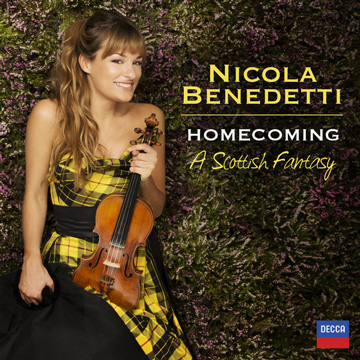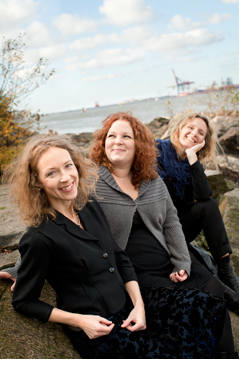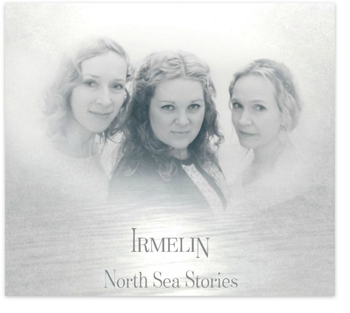 Album: Homecoming: A Scottish Fantasy (link here.)
Album: Homecoming: A Scottish Fantasy (link here.)
Artists: BBC Scottish Symphony Orchestra, conducted by Rory MacDonald, with violinist Nicola Benedetti
“My heart’s in the Highlands, my heart is not here;
My heart’s in the Highlands a-chasing the deer;
A-chasing the wild-deer, and following the roe,
My heart’s in the Highlands wherever I go.”
– Robert Burns
“The classical and folk story is one of endless collaboration and crossover, shared material and playing techniques. Our education categorises and separates traditions that were never that far apart. The more connections of this nature I discovered, the freer I felt to take liberties.”
– Nicola Benedetti
The Violin: The Great Isthmus
The violin is the isthmus between high culture and low culture in Scotland, its vitality the footing of the folk and the art song tradition, and its beauty and range making it the perfect vehicle for classical scores. Besides this, the classical tradition, deeply inspired by the melodies of shepherds, farmers, and working people, has reflected to an enormous degree the folk canon.
But Nicola Benedetti wasn’t permitted to play Scottish folk music during her early training; the rhythms and techniques were considered too complex and “other” than the classical repertoire to be of benefit to a classical violinist, and so her recent decision to take on this body of Scottish traditional tunes required a leap of faith even for this young maestro.
She did well, as all will attest; with Homecoming She’s now the first Scottish classical artist ever to have broken into the UK Top 20. Thanks to the invaluable aid of Shetland fiddler Aly Bain, Benedetti has interpreted these pieces with sincere passion and the traditional techniques necessary to their performance, and without a hint of highbrow condescension.
The Seam of Gold in the Craggy Rock
Traditionally Scots have come across in literature and film as rather cold and prickly creatures. (I wish I could remember the name of the comedian who compared the stereotypical Irish to the stereotypical Scots: “We Scots drink ?til we’re bloody drunk, and we drink alone because we have no friends . . .”). And anyone who’s heard Ivor Cutler’s monologue series “Life in a Scottish Sitting Room” can never forget the repressive grandfather traumatising the poor frightened children.
But all the pastiche goes out the window when we read the poetry of Robert Burns, that glittering seam of gold in all the craggy Scottish stone. True, he was pretty much abandoned by his neighbors, who looked down on him for some odd reason, but since his death he’s been adored by Scots the world over for speaking on behalf of their covert tender side.
It’s thus a meaningful coincidence that violinist Nicola Benedetti, the smoldering warmth of her Scottish blood given license on one side by an Italian father, was born and raised in Ayrshire, Burns’s home county and attended the Wellington School in Ayr, Burns’s birthplace. A child prodigy, she sailed through this school and later the Yehudi Menuhin School (under the teaching of Menuhin himself), emerging with an extraordinarily polished yet deeply sensitive and expressive style.
She also networks with musical education providers to promote and enhance musical training for youth. She’s an active role model in Scotland’s support of Venezuela’s Big Noise project. In addition, she recently put together her own education and outreach project?The Benedetti Sessions?helping many young string players to take part in master classes and eventually to perform with her. So she gets an extra bravo from the Mindful Bard for so zealously supporting and inspiring young musical talent and musical education.
The Line-up
The title track is a concerto written in 1880 by German composer Max Bruch and inspired by Scottish folk tunes, and the remaining lineup is representative of the music for which Scotland is universally known, including its best-loved songs (three are based on Burns poems? “Ae fond kiss,” “My Love is Like a Red, Red Rose,” and “Auld Lang Syne”).
Each song is addressed with great discipline and rigour by soloists and orchestra; no attempt is made to rough them up for authenticity, yet they sound terribly authentic as Benedetti does some masterful double-stringing. At times you want to sit and listen quietly with your hands folded, and at others you want to get up and dance a jig.
The highlands are as well represented on this album as the lowlands. Julie Fowlis’s tongue trips deftly over the dense consonants of Scots Gaelic in the songs “Bothan a bh?aig Fionnghuala” and “Coisich a Rùin” while delivering the slower songs with a heartfelt reverence.
The high point of the album would have to be “My Love is Like a Red, Red Rose,” which redefines the words “rhapsodic.” If ye’ve but a wee drop o’ Scottish blood in ye, I challenge ye not to weep like a bairn.
Homecoming manifests four of the Mindful Bard’s criteria for music well worth a listen.
– It’s authentic, original, and delightful.
– It provides respite from a sick and cruel world, a respite enabling me to renew myself for a return to mindful artistic endeavor.
– It inspires an awareness of the sanctity of creation.
– It makes me want to be a better artist.


